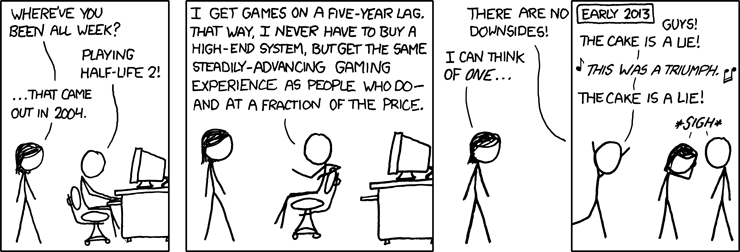Isn’t the pace of technological advancement remarkable? For less than the price of a month’s worth of kitty litter, one can buy an 8GB microSD memory card that is smaller and lighter than a penny. That’s enough to store the text of all English Wikipedia articles as of March 2010 with room to squeeze in a minimal install of Apple’s current desktop operating system ((2 GiB is sufficient for a bootable disk image of Mac OS X 10.6)). And that’s just one month’s worth of kitty litter.
The wheels of progress
For some strange reason, people seem to want faster and/or more capable technology as quickly as it appears. What most people need, however, is probably less of it. About a decade ago, we reached a point of diminishing returns for most users. However, as the capabilities of software continued to increase and their usability tended to decrease, otherwise ample hardware became bogged down in the great marketing-driven hardware/software update cycle and designed obsolescence.
This push for access to faster and faster technology borders on absurdity. A mid-range computer from ten years ago ought to have enough oomph for most; I stopped feeling the need for a faster computer around then and each new computer since replaced broken hardware or increased portability. I am not alone. Jon Pipitone, who has just finished his M.Sc. in computer science, does great work. What is his primary computer? A laptop that he bought seven years ago. Second-hand. It has taken quite a few licks in its time, though, revealing some of its guts, so we affectionately refer to it as BSG.
Slow and steady
I got a MacBook Air more than two years ago, but I still get people asking me about it whenever I take it out anywhere public like a library, Hot Yam!, or to meetings. About half the questions are a mixture of “what kind of computer is that?” (a MacBook Air), “is that the computer that fits in an envelope?” (yes), and “can I hold it?” (yes, if you have clean hands). The rest of the questions are almost entirely about whether or not the computer is any good, why I got the MacBook Air, and whether it is slow.
Before being debeakered, I did quite a bit of desktop publishing, 3D graphics work, and image editing with my PowerBook and it never felt particularly slow; sure, faster would have been nice but, since I don’t do those things for a living, not necessary. The MacBook Air, the slowest Mac since Apple made the transition to Intel processors four years ago, has been derided for its slowness. But when I tell people that the MacBook Air is three times faster than the computer it replaced, which was already fast enough for me, I often get asked about the storage capacity. My PowerBook had plenty of room to spare when I got a MacBook Air (at least if you exclude my photos and Stephanos material, which live on another machine). When Apple replaced my broken laptop, I decided to use the extra space to keep a copy of Wikipedia for off-line reference, or entertainment, as is often the case.
Sorry, I must be a bit slow, myself
Next, when I’m with tech-savvier interlocutors, I’m usually told by that I am stupid/ignorant and that a much cheaper machine can be had that is just as fast (or a faster machine for the same price), forgetting that I would not like to carry another 5 lb brick around (Steve offered me his top-of-the-line 3 kg 17″ MacBook Pro so that he could replace it with a 3 lb Air; I declined), never mind the fact that the 9 hour battery life that I can eke out has come in handy on multiple occasions. Kinder observers will instead tell me that, clearly, I must not be a power user, that I obviously don’t know much about computers, and/or I must use another computer for real work. I guess I really must be quite stupid, then, because here I was, all those years using a PowerBook, never mind its predecessors, thinking I was doing real work. I wonder if there’s a connection between those people and the ones who used to make snide remarks about me using a Mac and think I was kidding when I told them I was a computer science student (which, just for the record, does not mean one knows anything about computers, and I’m sure you niece/nephew really is quite good with them, even if she/he has never taken a computer-related class before).
Newer is better, right?
With the steady march of technology, the same amount of money buys more and more computing power every year. Or you could get the same thing as you had before, but smaller, quieter, lighter, cheaper, and/or more energy-efficient. The MacBook Air is fast enough for watching dancing cats in high definition ((I’m too frightened that it may actually exist to do a search and provide a link)). And while I’m sure it looks better when I can see each cat whisker and hairball follicle, I doubt that Jon Pipitone would be missing much by watching it in standard definition.
In terms of operating systems, Apple has improved the performance and power-saving features of Mac OS X over the last several years and Microsoft, though apparently being a bit hit-and-miss in terms of performance, has added power-saving features to newer versions of Windows. And what features make us buy new updates to applications? Sure, Word 2007 added the feature of eliminating Clippy from Word XP, but what’s wrong with WordPerfect 6? It may lack support for coding macros, e-mail integration, exporting to HTML, and barcodes, but what it lacks in razzle-dazzle, it makes up for by taking up less than 5% of the resources of Word 2007. Yes, that’s right. It uses 1/20th of the computing resources of Word 2007. Not only that, its quaint clipart and simpler image handling functionality might reduce the urge to dress up a document for no real reason. And how did we ever make presentations before the ubiquitous PowerPoint eliminated the need to waste time creating content?
Jimmy dies of dysentery
So, do I think I’m missing out by not having a faster computer? That’s a bit like asking NASA if using 8086 processors in the space shuttle until they upgraded to 386s meant they couldn’t get anything done. Maybe when I can play a game more than a million times more fun than the Oregon Trail or use a spreadsheet program that makes me work more than a million times more efficiently than VisiCalc (my laptop is on the order of one million times more powerful than the computers of that era) might I think I’m missing out a bit. Okay, so that was an exaggeration, but so is our “need” for ever faster and more powerful computers. But as it stands, for most of us most of the time, it’s our computers twiddling their collective fans ((In fact, some computer experience extreme narcolepsy, sleeping several million times between keystrokes.)) waiting for us slow-poke humans, not the other way around.

